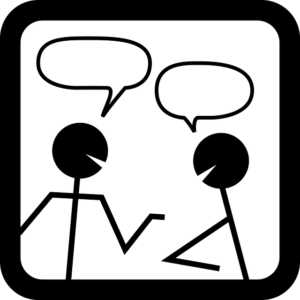When most people set out to learn a language, their intent is to eventually speak it. It’s very surprising to me that so many language courses spend so little time actually speaking. Their focus is on the written word. And I believe they do a disservice to those learning to speak their new language. Here are a few approaches you can take to improve your foreign language pronunciation and develop a greater level of comfort in speaking your new language.
1. Separate writing and speaking
First of all, think about each foreign word in two ways: its spoken form and its written form. Keep them distinct. In fact, it’s helpful to hear a new word and say it a few times before you see it in print. Memorize spelling after pronunciation.
Imagine you’re learning French. The French word for “fish” is poisson. Now, if you were to think about the lettering of this word just before you spoke it, you might get tripped up and say something that sounds like “poison.” Then, having gotten confused once, you could form a mental block that causes you to keep messing it up. Thus, you may get a little flustered and tongue-tied each time you request seafood at a Parisian café.

On the other hand, if you learn how to spell “poisson” after you hear its two syllables, you’ll be in better shape.
In addition, before speaking this word, you might try to hear the “pwa” and “ss” sounds in your head. If it helps, when you’re a beginner, you could even picture the shapes your lips will form when you say the word. You’ll pucker up for the first syllable and round your lips for the nasal vowel at the end.
2. Take Speaking a New Langauge One Step at a Time
Obviously, every language has some really long words, and they can present challenges even to native speakers. But don’t let those lingual behemoths scare you off. To use a French example once more, the word compétitivité means “competitiveness.” Naturally, what makes this word daunting is its series of six rapid-fire syllables, which include two accented vowels.
However, on its own, each syllable is simple and straightforward. Therefore, as you say this word, you’ll want to play each syllable, one at a time, in your mind. And, as soon as you hear each syllable, you can repeat it out loud. Don’t rush, but don’t linger over any part of the word. With care and confidence, you’ll get through the whole thing. And with practice, you’ll be fine.
3. Immerse Yourself in Your Target Language

When you frequently listen to people speaking another language, you can pick up all kinds of foreign language pronunciation tricks, sometimes on a subliminal level. Thus, as often as you can, rent movies or watch television shows in the language you’re learning. With the internet, you can view a variety of foreign programming right on your mobile device.
Indeed, your smartphone can be an incredible language teacher. Whenever you’re driving, walking, waiting for a bus, waiting for your dentist, or doing countless other chores, you can listen – with or without headphones – to a foreign language. Listen to books on tape. Subscribe to a podcast. Follow radio shows in a different tongue. The options are endless.
Through it all, pay close attention to the accents, the pauses, the syllables that are emphasized, and the rise and fall of the voice. There are all kinds of minute, yet critical lessons you can discern on your own. And they all contribute to the uniqueness, musicality, and conversational nature of a given language.
Most worthwhile of all, talk to native speakers as much as you can. Maybe the folks who live next door speak German. If you’re studying German, why not have them over for dinner? If you’re working on your French, how about a long weekend in Montreal? You get the idea. You might feel a little self-conscious at first, but many people are flattered that you’d like their support. Plus, most of those same people love to speak a second language they’re fluent in.
Having an actual conversation forces you to think through your phrasing and helps you grasp colloquialisms, idioms, and snippets of body language that don’t always translate well. When it comes to languages, it’s too easy to get rusty. For that reason, try not to let a day go by without some exposure to the new language you want to speak. Don’t make excuses, and don’t let up!
Reach Fluency By Being a Stickler

Imagine you’re working on a long algebra problem. You complete each step in the correct way, except that you forget to “carry the one” at some point. You get the answer wrong. So it often is with languages. Mispronouncing one sound can throw off an entire sentence’s meaning. Worst of all, you might even say something offensive without meaning to.
With that in mind, concentrate on every vowel and each consonant cluster. Once again, don’t merely memorize the spelling and meanings of words. Strive to learn, stressed and unstressed syllables, and every other nuance of sound. Listen to your tapes and apps with your complete attention. If it helps, close your eyes, relax your muscles, and soak in each sentence.
If you’re taking a course, you might ask your teacher or professor for permission to record your classes on your phone. That way, you can revisit them later on. As you repeatedly listen to the vocabulary words and sample sentences, you’ll drive each detail into your memory banks. And, if you’re having a little trouble, you might ask your teacher for extra help sessions or for a tutor. With one-on-one instruction, you’ll be able to address any foreign language pronunciation inaccuracies.
5. Learn Your New Language in Context
Saying entire words aloud is more productive than repeating a certain sound on its own.
Maybe the é in French throws you off. Instead of making that sound over and over again, try speaking different words that contain an é. After all, the é can have a slightly different ring to it depending on the word it’s in. What’s more, isolating a particular sound can cause you to distort or over-emphasize it. Repeating that one vowel excessively could result in you over-thinking every é that you come across, making your delivery a little stilted.
As a corollary, speaking an entire phrase or sentence is more useful than reciting a single word or a list of words. That’s because every sentence has its own rhythm and cadence, a distinct ebb and flow. Also, in some languages, certain words are said faster when they’re together than they are separate.
In the final analysis, languages were developed for the expression of ideas and emotions. They’re not primarily about individual sounds or even individual words. To truly grasp a foreign language’s pronunciations, concentrate on communicating complete thoughts.
6. Use Shadowing When Speaking a Foreign Language

Shadowing is a valuable technique for practicing foreign language pronunciation. It goes a step or two beyond merely listening to instructions or programs in a foreign language.
First, find an audio sample of a person reading a short piece in a foreign language. It could be a news article, a story, or something else. Or you might settle on a page of text from a language learning app. This material shouldn’t be too easy or too advanced for you. You should be able to understand nearly all of the words of the text. At the same time, comprehending the whole thing ought to be a bit of a challenge.
Once you’ve found the right material, begin the exercise in earnest. Listen to the text all the way through a few times. Make sure you understand the gist of it, if not all of the specifics. Once you have an overall sense of what it’s about, you can take it in more slowly. And you can pause here and there to search the internet for the words or phrases you don’t know.
Now that you’re very familiar with the reading, it’s time to speak. Starting from the top, play as much of the recording as you’ll be able to remember verbatim. That might be one sentence; it might be a few sentences. Press stop and repeat what you just heard. Articulate your words as clearly and accurately as you can.
Do Your Best to Reproduce the Audio

As you’re speaking, record your voice on your smartphone or another device, and then playback your words a few times. Listen carefully to your enunciation. How close to the speaker do you sound? What do you need to work on?
Keep reciting the passage until you’ve got it down cold. You don’t have to record every repetition if you don’t want to. Continue this process until you’ve made it all the way to the end of the piece.
When you’re finished with this assignment, you’ll know, or almost know, the text by heart. That’s good. Later on, you can repeat this activity with a wide range of written materials, everything from love poems to travel brochures. All you need is an expert’s voice on tape to guide you. It’s great to practice shadowing as often as you can.
Why is shadowing so beneficial?
When you merely listen to your voice as you speak, you can get a warped sense of how you sound. It’s easy to imagine we sound better than we really do. But when you’re forced to hear your voice on a recording, you can perceive what you’re doing right and wrong with much greater accuracy. Then, when you immediately compare your own foreign language pronunciation to that of a fluent speaker, you get an even more precise sense of your current proficiency level and how to improve.
On top of that, when you listen and repeat the same sentences over and over, you can fine-tune the speed of your words, your breathing, and your pauses. As a bonus, you pick up new expressions to use in future conversations. Because you’ve said and heard them so many times, they’ll really stick in your head, and you’ll recall them as soon as you have a use for them.
7. Master Foreign Language Pronunciation By Focusing on Getting Better, NOT Perfection

Wait a minute. Doesn’t this rule contradict the “be a stickler” rule? Well, in actuality, these two directives go hand in hand. Yes, you should always do your best to reproduce every foreign language sound that you hear precisely. Work hard. Focus. And always take your time.
Even so, there may be a diphthong or a rolling consonant that gives you trouble every time. Try as you might, your throat or tongue won’t get it out correctly. In that case, feel free to take a break and attempt a different exercise.
You’re allowed to have an accent! Many people in countries all over the world function extremely well with pronounced foreign accents. Don’t let anyone’s foreign language pronunciation hold back your studies or steal your momentum. Keep moving forward; keep learning new words and sayings.
Have Fun While Speaking and Build Bridges

In the end, learning a new language should be fun. Sure, it’s a lot of work, and it demands a deep respect for other ways of life. But it’s exciting to watch a foreign movie and know what the performers are saying without the subtitles.
It’s even more thrilling to speak to someone else, at home or abroad, in his or her native tongue. By doing so, you’re not only enriching your life and broadening your wellspring of experiences, you’re building a bridge across two cultures. With your newfound pronunciation skills, you’re making the world a little smaller and a little more peaceful.







